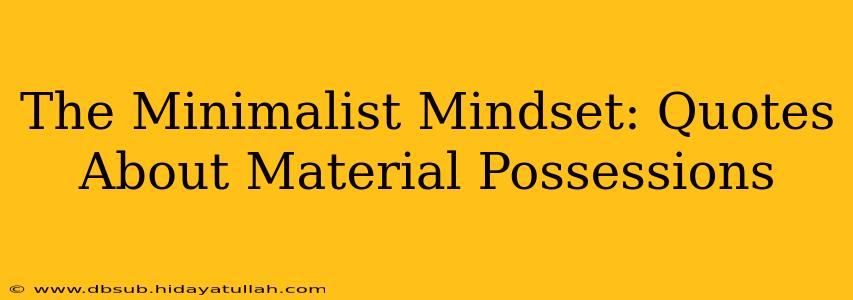The minimalist mindset isn't about deprivation; it's about intentionality. It's about consciously choosing what adds value to your life and letting go of what doesn't. This shift in perspective often involves a reevaluation of our relationship with material possessions. Many insightful quotes capture the essence of this philosophy, offering guidance and inspiration on our journey towards a more intentional life. This article explores several profound quotes about material possessions, delving into their meaning and relevance in today's consumer-driven world.
What is Minimalism?
Before we dive into the quotes, let's briefly define minimalism. Minimalism is a lifestyle that emphasizes intentionality and purpose. It's not about owning nothing, but about owning only what adds value to your life – things that serve a purpose, spark joy, or contribute to your well-being. This often involves decluttering physical possessions, but it extends beyond that to encompass a mindful approach to all aspects of life, including time, experiences, and relationships.
Powerful Quotes on Material Possessions and Their Impact
Here are some powerful quotes that encapsulate the minimalist mindset regarding material possessions:
"The less you own, the less you worry." – Unknown
This simple yet profound statement highlights a key benefit of minimalism: reduced stress and anxiety. Clutter often contributes to mental clutter, leading to feelings of overwhelm and anxiety. By owning less, you simplify your life and reduce the burden of managing numerous possessions.
"Things will not bring you happiness. Happiness is not in things." – Unknown
This quote emphasizes the fallacy of equating happiness with material possessions. The pursuit of happiness through accumulating things often leads to a cycle of dissatisfaction, as the joy derived from new possessions is typically fleeting. True happiness comes from within and is nurtured through experiences, relationships, and personal growth.
"It is not the man who has too little, but the man who craves more, that is poor." – Seneca
This ancient wisdom reminds us that true poverty isn't necessarily a lack of possessions, but rather an insatiable desire for more. This endless craving keeps us trapped in a cycle of wanting, preventing us from appreciating what we already have.
"Empty your mind, be formless, shapeless – like water. Now you put water in a cup, it becomes the cup; you put water into a bottle, it becomes the bottle; you put it in a teapot, it becomes the teapot. Now water can flow or it can crash. Be water, my friend." – Bruce Lee
While not explicitly about material possessions, this quote speaks to the adaptability and flexibility that a minimalist mindset encourages. Just as water adapts to its container, we should be adaptable and not let our possessions define us. A minimalist approach helps us remain fluid and responsive to life's changes.
Frequently Asked Questions (FAQs)
H2: How do I know what to get rid of when decluttering?
The "joy check" is a popular method: hold an item and ask yourself if it sparks joy. If not, consider letting it go. Alternatively, you can categorize items by function and necessity. Ruthlessly eliminating duplicates, broken items, or things you haven't used in a year is a good starting point.
H2: Isn't minimalism expensive?
Minimalism isn't about buying expensive, high-quality items to replace everything you own. It's about choosing items wisely and prioritizing quality over quantity. By being more intentional with your purchases, you'll likely spend less overall in the long run.
H2: What if I get rid of something and regret it later?
It’s a valid concern. Start small. Declutter one area at a time and take your time. Consider taking photos of items before you donate them. And remember, most things can be replaced if needed.
Conclusion
The minimalist mindset encourages a conscious and intentional relationship with material possessions. By embracing the wisdom found in quotes like these and thoughtfully evaluating our needs versus our wants, we can cultivate a life of greater purpose, freedom, and joy, unbound by the constraints of excessive material accumulation. The journey towards minimalism is personal and unique to each individual, but the overarching goal remains the same: to live a more meaningful and fulfilling life, regardless of how many things we own.
